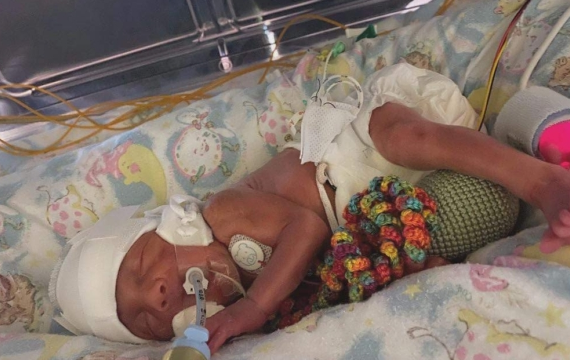
Nine-day-old child tested positive for coronavirus before dying, days after her mother became infected.
A British baby born prematurely to a woman who contracted COVID-19 in late pregnancy has died, according to media reports.
Katie Leeming, 22, tested positive for coronavirus while heavily pregnant last month after she began suffering cold-like symptoms in early October.
Within a week, Leeming said she stopped feeling her baby moving and contacted her local hospital in northern England.
Doctors delivered the baby, named Ivy-Rose, by emergency caesarean section on October 13 after expressing concern over the reduced movement in the womb.
Ivy-Rose, who was 14 weeks premature, weighed 990g (2lb 3oz) at birth.
She was transferred to a specialist neonatal care unit having suffered a range of complications, including a pulmonary haemorrhage and a brain haemorrhage.
At about five days old, she tested positive for COVID-19. Four days later, she died.
Her death certificate states the causes of death as extreme prematurity at 26 weeks, severe respiratory distress syndrome, maternal COVID positive and baby COVID positive, as well as intraventricular haemorrhage.
“We got a phone call on the evening of day eight saying we needed to get to the hospital as they didn’t think Ivy-Rose was going to make it through the night,” Leeming told the United Kingdom’s i news website.
“They took her hand and footprints for her memory box and Ivy-Rose died on 22 October at 1.30am. We were absolutely heartbroken and it still hasn’t sunk in,” she said.
Leeming was not vaccinated against COVID-19, which is currently surging through the UK once more.
She opted against getting inoculated after speaking to other pregnant women.
“I felt there wasn’t enough research done into the impact of the vaccine during pregnancy and if it would affect the baby,” Leeming told i news.
Leeming added she would not reconsider her decision following Ivy-Rose’s death, citing cases where relatives and others have been infected with COVID-19 even after being fully vaccinated.
“I can’t start thinking that way as who knows what might have happened if I had the vaccine and I might still have got COVID and become ill,” she said.
Britain’s National Health Service (NHS) says women can safely get vaccinated against COVID-19, and that it is preferable for them to receive the jabs produced by Pfizer-BioNTech and Moderna.
“This is because they’ve been more widely used during pregnancy in other countries and have not caused any safety issues,” NHS guidance states.
Leeming’s case highlights the dangers posed by the pandemic as the UK heads into winter.
The country has struggled to contain COVID-19 in recent months despite enjoying initial success in rolling out a mass vaccination programme earlier this year.
On Tuesday, health minister Sajid Javid said the UK would make it mandatory for all front-line National Health Service (NHS) staff in England to be vaccinated against COVID-19 by April 1.
“We must avoid preventable harm and protect patients in the NHS, protect colleagues in the NHS and of course protect the NHS itself,” Javid told Parliament.
The move follows a similar decision to make COVID-19 vaccines compulsory for care home workers, which comes into force on Thursday.




